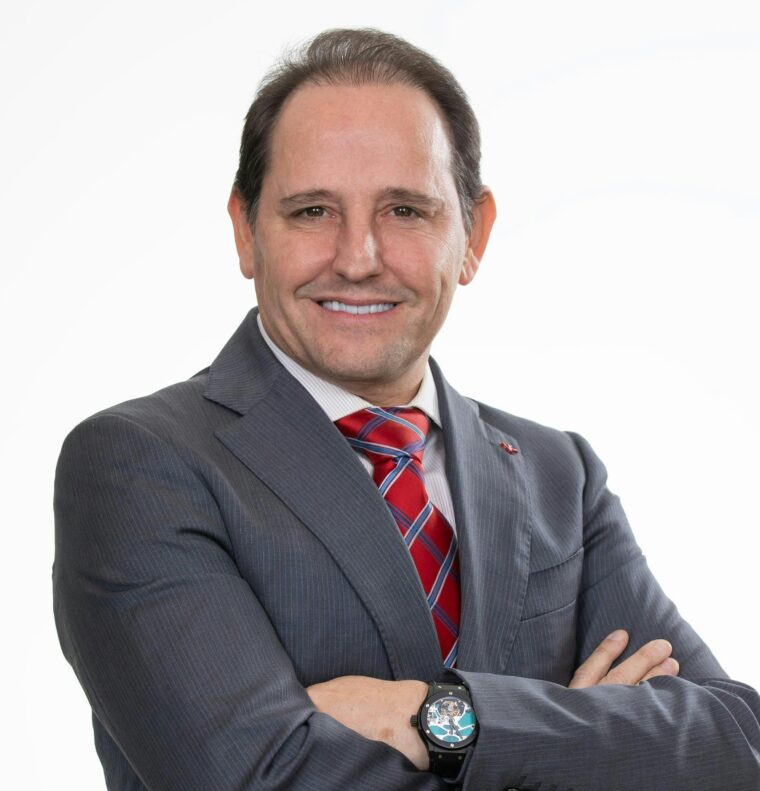Portuguese people who are making a name for themselves abroad are helping to find out where business opportunities are and what kind of companies and activities the country can attract. An initiative that brings together Negócios and the Portuguese Diaspora Council.
1- What led you to leave Portugal?
In 2003, I was invited by the company I was working for at the time (Raytheon Technologies Company, now RTX) to take up a position in Germany, in the Frankfurt area. It was an excellent opportunity for personal development and a great deal of personal and career growth. For these reasons, it seemed like a good idea at the time. Today I can see that it was one of the best decisions I ever made.
In 2008, I changed companies and, already at SPX, I was transferred to Switzerland. From then on, I changed companies a few times and progressed as a professional, my view of the world expanding with these experiences. I’m very pleased with the experience I’ve had in broadening my horizons and learning.
2- What advantages or disadvantages did being Portuguese bring you?
I don’t think that nationality has brought me any advantages or disadvantages… My cultural identity is clear and lived naturally. I never felt that my passport dictated my path. In the context of the companies I’ve worked for, whether American, German or French, professionals are valued for their performance and skills – passports don’t add value or differentiate. The organizations I’ve been part of have multiculturalism at the heart of their activities, with several working languages, different approaches to day-to-day challenges and shared goals.
At the moment, I have dual nationality (Portuguese-Swiss) and, apart from some differences in obtaining visas in one country or another, I don’t see much change…
3- What obstacles did you have to overcome and how did you do it?
As with any change, there is a period of adaptation. Assimilating new rules and social conventions, learning to do tasks that were taken for granted in Portugal and which now require different processes, are all examples of situations that require a few months of adaptation. German bureaucracy and culture are different from ours, and this discovery is both a challenge and an enriching adventure! The language (German) gave a different color to the days, and these are all things that you overcome and that contribute to your growth as a person, both professionally and personally.
In my case, the climate was one of the things that took me the longest to adjust to: from (re)learning how to drive in winter, to choosing when and how to go out, among others. Experiencing four seasons on the same day was something new. Then there’s that feeling that we talk about so much because it’s so much ours: I can say that I’ve learned the meaning of the word saudade… of people, smells, noises and food.
It was very important to ask for help from colleagues and friends here and in Portugal to overcome the initial difficulties. Overall, however, I can say that I haven’t experienced any major obstacles – I think my adaptation has been successful. Today, I think I’m at home here…
4- What do you admire most about the country you’re in?
Now, I live between Switzerland and Germany. In both countries, I deeply admire the sense of duty, organization and civic mindedness. The quality of life is high and the access to and quality of health services, education and administration is easy and efficient – very much because people work in a consistent and structured way.
There is a great balance between professional and personal life, with favorable policies for leisure time. This reality makes it possible to have activities other than work, and most people have hobbies and a healthy lifestyle.
Switzerland, in addition to its natural beauty, is very central, being close to several countries: with accessible public transport, it is easy to visit other countries such as Italy, France, Germany – this mobility is an added advantage.
5- What do you admire most about the company or organisation you work for?
Bosch is an organization rooted in its history of almost 140 years and keeps alive the values of the Founder, Robert Bosch – a humanist and Europeanist.
We are a Group very focused on innovation, with a culture of curiosity and collaboration, a truly global company, and this is something that has strongly contributed to my learning and view of the world.
Bosch is a company that has very strong and well-defined values, aligned with a clear sense of purpose, supported by something very important which is our corporate culture, which is based on values such as innovation, diversity, social responsibility, efficiency in the rational use of resources and environmental protection, and which guide the way we do our daily work. Our orientation towards the future and focus on sustainability means that we are a company that invests heavily in innovation and technology. Anyone who joins Bosch knows that they are in a company that has at its roots this constant quest to innovate, to create technology that makes a difference to people’s lives and to society in general.
In addition, Bosch, as an employer, has a purpose that involves valuing its people, as well as promoting a sense of belonging, and promotes internal mobility policies that provide employees with various possibilities for career development in multiple areas and different countries.
6- What recommendations would you give to Portugal and its entrepreneurs and managers?
I think there are some very important aspects that I see need to be strengthened and developed:
Vision: Having a clear vision of what you want to achieve is fundamental. Strategic development based on well-defined criteria and clear, medium-term funding (scenario development and risk management) are very important aspects of business management. Alignment with priorities such as sustainable and ethical growth are extremely important.
Leadership: From the moment we assume responsibility for the fate of a project or company, we must understand that turning vision into reality takes time and requires ethics and perseverance. It is crucial to demand and offer this ethics and consistency.
Recruitment and Retention: implementing fair people management practices is vital. It is important to make sure that the best resources are hired, that we compensate them fairly and that we provide them with development opportunities.
7- In which sectors of the country where you live could Portuguese companies find clients?
Switzerland tends to invest and innovate as a way of expanding its own economic relevance. There are many examples of this in Portugal. I don’t think there is a specific area. However, Switzerland is a hub for innovation – generally ranking at the top of the world. This leads me to believe that exploring ways of partnering and supporting the expansion of this high value-added intellectual property would be a good way for Portugal to take advantage of the great platform that is the Portuguese community living in this country.
8- In which sectors in Portugal might companies from the country where you live want to invest?
I think the technology areas are interesting, not least because Portugal has a lot of talent in this area, with high quality training, which is recognized at an international level, and which is why talent trained in Portugal is desired and in demand by companies all over the world.
9- What is the competitive advantage of the country you live in that could be replicated in Portugal?
Taking Switzerland as an example, the advantages of investing in education, research and innovation in high-value areas are a real differentiation of the economy. If you think about it, you realize that, as a “small” country, it has found ways to remain relevant and attractive through this strategy.
There is a very strong incentive for continuous training, which is common practice in Switzerland. This helps keep the workforce up to date with the latest trends and technologies.
Partnerships between companies and educational institutions: close collaboration between companies and educational institutions in Switzerland ensures that curricula are relevant and aligned with market needs, facilitating students’ transition into the job market.
10- Are you thinking of returning to Portugal? Why do you think so?
Not “full time”. I like living in Switzerland and Germany. With the ease of communication and transportation, I can enjoy short trips back and forth, keeping in touch with family and friends, and continuing to grow personally and professionally.







